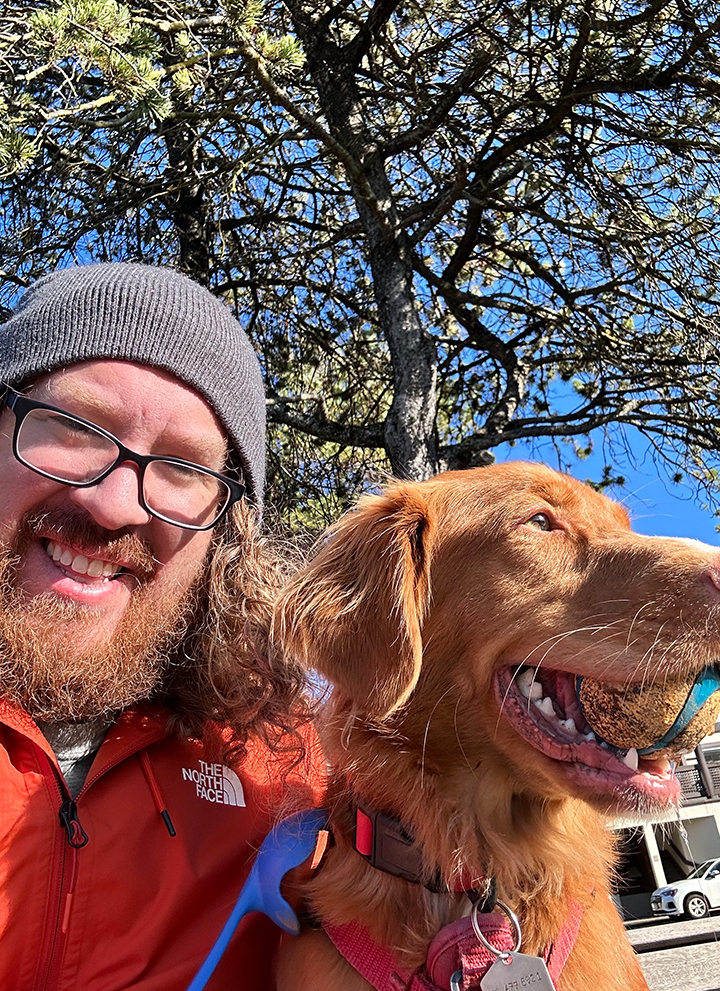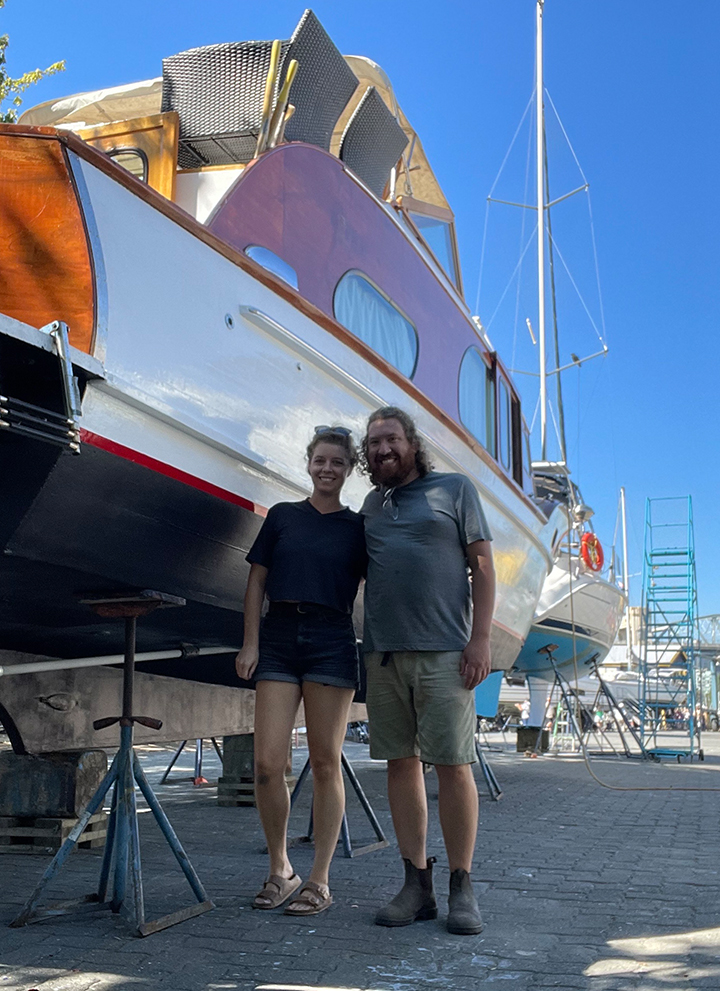
By: Sophie Allen May 14/2025
Continuing our Interviews with the Experts series, I caught up with our Head of Paid Media, Alistair Hayward. Being the Head of Paid Media and pawrent to a very energetic puppy, finding time to sit down for an interview can be tough. Like Kavan, I first started working with Alistair at another company back in 2017, but as we were in different departments, our interactions were limited to company Nerf battles at best. After a few years apart, we’ve found ourselves as colleagues once more, though now a bit older, a lot more mature, and more seasoned professionals from our days in automotive.
Our reunion went something like “I live on a boat now!” and “I’ve got kittens!” which has probably shaped how we are seen within the company–Alistair as El Capitan and me as the crazy cat lady. Neither of these things will have anything to do with this interview, though, so with a nod to Alistair’s nautical lodgings, let’s dive right in.

My days are rarely the same, which is something that I love. My responsibility as the Head of Paid Media is to guide the department as a whole. Are we adopting new technologies? How are we implementing our strategies at the top level? How are we interacting with clients? What direction is the department headed in, like, what channels are we adopting, how are we using them, are we learning new things because everything is changing all the time.
I’m also collaborating internally with other departments, other leadership roles. Collaborating with ownership on bigger company direction type stuff from a paid media perspective.
I’m mentoring and guiding the more junior team members. I think as far as Paid Media team members go, I have been in the industry the longest, coming up on eight years, which isn’t nothing. So with that experience, working with all kinds of different clients in different industries, on different platforms, having seen the platforms evolve over those eight years, I have a lot of knowledge that I can share. And so whether that’s working with the specialists on their account and training them, working with more senior team members on more complicated, nuanced problems, that’s a big part of my job.
On a day-to-day basis, I am doing a lot of client communication, management, and relationship management with clients that may be more complex. I’m providing a more high-level strategic point of view for those relationships and thinking bigger picture for them while allowing the strategists to handle more of the data and short-term goals. I’m there to provide the longer-term direction and any additional support that might come up in that relationship.
A lot of meetings, both internal and external. A lot of email writing. That would be my day.
Keeping the team engaged, motivated, and inspired is a tough role, but it’s a challenge that I enjoy. The industry is constantly changing, and you’re constantly having to question your own knowledge because you’re never going to know everything; there’s always going to be something new. So it’s always going to be challenging, and you’re challenging your confidence. And that will make you think “do I even know what I’m doing?” and part of my job I feel is like, reassuring the team that they do know what they’re talking about and that they are more or less experts in their field and that they’re looked up to by our clients who don’t have the same level of knowledge or expertise that we do. That’s an interesting aspect of my role.
What would you say is the most enjoyable part of your role?
There are a lot of different aspects of my role that I enjoy. I think the people aspect is #1, not just the internal relationships, but the external relationships–getting to know the clients in their businesses over sometimes multiple years of a growing relationship and seeing the value that that knowledge and our teams’ knowledge can bring to their business and how that can help them achieve their goals. Relationships are the biggest enjoyment for me.
But also the fast-paced nature of the industry–it’s always changing, it’s as a whole getting better, getting easier, more intuitive. As technology improves, the advent of AI and machine learning, we’re able to do more for clients because of some of these advances and marketing is always trying to get better and more relevant to the users that you’re targeting. I enjoy seeing those developments happen and being able to learn those developments and then learn how to apply them to a whole bunch of different problems, like my toolkit is constantly growing, essentially. I’m getting better tools all the time, so that part I enjoy.
What would you say is the most difficult part of your role?
The challenge or the most difficult parts are also the things that I enjoy the most, because of the challenges of keeping up. That can be stressful, and there’s a lot of noise; clients are hearing a lot of information about all these new technologies and that can make it difficult. While we always want to be helping our clients adopt these technologies and new strategies, it can be challenging to also maintain a level of consistency because, with marketing, you have to be consistent. You can’t pivot too drastically too often, especially with digital, because so much of it relies on consistent data and making incremental changes over a longer period of time as opposed to constantly switching your direction. Because things are changing so fast, it can be really enticing to like, you know, that shiny object syndrome like “oooh I’m hearing about AI. I’m hearing about this new thing I want to that,” and absolutely, it’s great to incorporate some of those new initiatives into your longer term strategy, but it’s also important to remember that you can’t just abandon this other initiative that you’ve been working on, this data collection. You can’t just abandon that completely and change your direction. So I guess the challenge really at the core of that is tempering client expectations or keeping clients grounded in their strategy and reassuring them that there’s a reason for the decisions we’re making and bringing it all back to the data. Client relationship management is a challenging aspect. And of course, as an agency, maintaining profitability is a big responsibility too. So, managing expectations, making sure that clients are understanding and seeing the value that we’re bringing, while also ensuring that the relationships remain positive and profitable. It’s a balancing act for sure.
I appreciate you bringing in the client aspect of it, too. Is there anyone you want to give a special shout-out to?
One of the clients that I’m most involved with from a relationship standpoint, since it’s such a large relationship with so many moving pieces, is the Provincial Health Services Authority (PHSA), with three agencies that we work with currently. It might grow beyond those three, but that relationship has been really enjoyable because I think we’re coming to the third year of that relationship, and we can already see the impact that our work has had, and it’s really important work. It’s like recruiting health officials and people to work in the health industry, which we know is an important thing for the province. So just knowing that I’m doing something to assist in that is cool. The people I’ve gotten to work with at the PHSA have been great. They’ve got big budgets and can develop really cool creatives with the help of another agency that we work with. I love those big, meaty projects.

Honestly, seeing the team grow in their skills, but also just the size of the team growing, is a sign for me that something’s working. Seeing people in their roles learn and grow, and move up from junior to senior and beyond, keeps me motivated because I do like to think that I’m a part of that growth. From supporting their opportunities to learn new skills and in some cases teaching those skills directly from my own experiences, I am only a couple years ahead of some of my coworkers, so it’s not like I’m teaching the next generation by any means, but at the same time, even the few extra years that I have I can see that little bit of experience that I can pass along to those who are coming up in the industry behind me, it’s really motivating and enjoyable.
Not just the growth of the employees, but also the growth of the clients. I’ve got clients like Green Line (Hose and Fittings), a great example of a company that has, in the years that I’ve worked on their account, which is about five years now, their online sales have grown exponentially, and their whole business model has changed because of that. You know, going from a very traditional, in-store purchasing, like their sales reps selling in a very old school way, to now encouraging online sales, and they’ve developed an app to support that. Their business has transitioned to being so much more online because of the success that we saw early on, and then they kept leading into that, and it just kept growing and growing, and now they’re making like millions and millions of dollars a year from their online revenue. I think a lot of that is the work that Snaptech has done for them both on the paid side and on the organic side, so, yeah, seeing that growth is super motivating for me.
Yeah, this is a piece of advice that I try to give any of our new team members and interns is really try and understand the why and not just the what. Like, why things work, what is the relationship like, why are the metrics related, and why do we see, you know, a change over here, what happened over here to cause that relationship? I think a lot of people focus on the baseline definitions of matrix but not on understanding the relationship, the cause and effect. So spending as much time understanding why we do things and why we make suggestions, I think that is important, it’s where good strategy comes from.
Another thing I would say is you don’t need to be an expert in everything in digital marketing. Rely on your team. Rely on the knowledge of others to fill in the gaps. You’ll never be able to be an expert in everything in this industry, so don’t spread yourself too thin by trying to specialize everywhere. A decision I made relatively early on was that, as important and as valuable as SEO and organic is, I knew that it was too much for me to know it in depth, and it would be at the detriment of my skills and knowledge on the paid side of things. So I rely on our wonderful SEO team to be the experts in SEO. I know the concepts, I know the general methodology and the basics, but I will never pretend to be an expert in SEO because there are experts in SEO, and I’m not one of them, and that’s ok, that’s completely fine. In fact, it’s better that way because it’s good to have a diverse team providing their strategy rather than just one person who apparently knows everything. No one is like that.
That’s a great question. I think….don’t wait to experiment if you’re curious about something. Just try it. If you have a hypothesis and you want to test that, the best way to do it is to just do it. Find a client or an account if you’re working at an agency, or find small things you can test incrementally to help. Use your clients’ businesses as an opportunity for you to learn because everything is all about testing, and you can’t, in a lot of ways, learn this stuff just through theory. You’re not really going to understand it until you can actually test it yourself. So don’t wait for there to be some sort of article or something that you can read or be told–you’re not going to understand it until you try it yourself. So yeah, any opportunity you can to do it practically, take it. I think it’s important to be someone who asks great questions. Looping back to that why–understanding the why–keep probing to better understand the aspect, not just asking the question like “what does this mean?” but “why is this important?” or “why should I know this?” or “why are we doing this as oppose to that?”
Communication, I think, is an incredibly valuable skill because part of our jobs as experts in this field is communicating. There’s this information, this data that we have access to, communicating to stakeholders, clients, other team members, what it means and why it’s important. So, being an effective communicator is vital to maintaining client relationships. If a client doesn’t clearly understand what it is that you’re sharing, it could be the most valuable piece of information that you’ve seen, but if you’re not able to communicate that effectively to the client, then what’s the point? The client won’t necessarily understand the value and could undervalue that work. Tying that information back to their business and helping them make the right decisions for their business based on what we know all comes down to communication skills, in my opinion. It’s more than just being able to write good emails, that’s so easy now with some of the tools that are available to us. That’s one thing, but verbal communication and in-person communication skills, I think, are just as important as writing skills nowadays.
Is there anyone you’d recommend following, or anything you recommend reading for someone to decide if they want to be a marketer?
I don’t follow any individuals specifically, like no influencers in the space–not to say that there aren’t great individuals out there, I just don’t follow anyone specifically. There are consistent sites that I tend to turn to, like news sources for updates in the industry and new perspectives like Search Engine Journal, Search Engine Land from the PPC space. I have a daily email that comes into my inbox from the Marketing Brew, it’s specifically what’s going on in the world in marketing today which I quite like and it’s skimmable, if there’s anything that catches your eye, you can click through to the more detailed article that they’ve got. Regularly checking in on those types of sites and industry-specific sites, I’m sure you’ll get exposed to other individuals and influencers in the space.
Are there any tools that are free or low-cost that someone can check out and play around with to get a feel for the industry or the job itself?
This is the challenge that a lot of students have when they come as an intern. It’s not something you can easily teach, like the practical implementation, because there aren’t a ton of free tools that you can play around with, especially in Media Buying. It’s a pay-to-play space. You can’t play around without there being some sort of money involved, whether it’s a subscription to the tool itself or having to create a business profile first before being able to play with the tools. With Google Keyword Planner, you can set up a business account for yourself without having to actually spend any money if you want to see the layouts of the platform. Google Ads, you can go into and see how it looks and be able to familiarize yourself with the navigation of the platforms because they are quite complex spaces, but to actually learn how to use them is pretty difficult without actually having the money to spend, unfortunately. I’m sure there are videos and tutorials on YouTube or wherever that can at least expose you to how it looks when someone has the money to spend, so you don’t have to necessarily have your own money. You could watch someone do it, but in order to do it for yourself, it’s difficult unless you’ve got the money to spend on the ads themselves, unfortunately.
The first big career highlight for me was at my first agency, Convertus, which we’re both familiar with. I was presented with an opportunity to try Facebook ads, which was a pretty new thing. It wasn’t a new technology, but it was a new thing to the agency. Very few clients had experimented with Facebook ads at the time, no one was really interested in learning the platform, so as an intern with the extra time that I had to learn, I took that opportunity to teach Facebook ads to myself and that eventually became a department on its own at that agency that I managed to build up. That was a huge moment for me in my early career, it gave me a ton of confidence.
Recently, I think it’s been evolving the Paid Media department here at Snaptech. My three, almost four, years of Paid Media, seeing some of the bigger ideas that I’ve had for the department be implemented and processes adopted for managing client relationships, whether it’s the matrix we use for monitoring client sentiment and performance and all those different aspects of a client relationship, we could predict churn risk a little easier. Or assisting the team with adopting a framework on how to use AI is another thing that I’ve really enjoyed doing. And then some of the relationships that I’ve developed with clients in particular are a highlight for me.
Editor’s Note: Alistair came and taught the SEO and Content team about Facebook Ads back at Convertus, and was a great teacher. All I know about paid media is Facebook ad targeting that Alistair taught me.
I think about this a lot, not because I don’t want to be in paid media, but if I were to change careers at some point in my life, no matter what, I’d want to somehow apply the skills that I’ve developed. Whether that’s owning my own business and knowing how to market that business, or working for another company that wasn’t an advertising agency or in a marketing capacity. There are skills that I’ve learned that I would want to apply, like helping a business grow in some way.
If I had a dream, it would be to kind of have my own business, like having a small organic farm on Vancouver Island, not just having the farm, but like what I could do to generate revenue from that farm, like have a small brand at a farmer’s market or something. That would be the dream. Or working for a client, a company, or a brand that really reflects my values, whether that’s in marketing or not. Whatever it is, I still want it to be rooted in storytelling, relationship development, and helping whatever the business is to ultimately grow and improve their operations through a marketing lens.
Strong strategy starts with clarity. A value, audience, and outcome. Understanding those three things, the value that you bring, who your audience is, and who you’re speaking to, whether that’s the client or the client’s audience. Understanding who you’re speaking to, having that clarity, is important. And the outcome that we’re trying to achieve and what we have achieved, if you can understand those things, that’s where great strategy comes from. Collaboration, I think, is the heartbeat of great marketing, both internal and external. You’ll never be the expert of everything, especially the client’s business that you’re working with. You’ll never be an expert of their business, so don’t try to–let them be the expert there and you be the expert of what you know and then collaborate to create that winning strategy. Tools and tactics change, but people and relationships will always remain the core of our industry, so putting that relationship first, I think, will help you in the long run. Lastly, stay curious. Stay generous and keep building things that matter.

Oh man, that is a tough question. I think I’m going to be diplomatic about this. I think Canada has the best variety and creativity in its beer making. I think now that has changed in Germany, like craft beer is obviously a growing thing there too, but I think we’re not as bound to tradition about beer as much as Germans and Europeans are and I think that allows us to be a little bit more creative and wild and you know, there’s so much more variety in the beer that we have here and there isn’t a stigma around breaking long standing 100 year old traditions of like “this is not beer”. That being said, the types of beer that Germans make, the lagers, the pilsners, the traditional beers, the Canadian versions of those types can’t compete, but I would put a Pacific Northwest pale ale up against a German pale ale and day and we’re going to crush them on that type of beer. But you know, a good crisp, clean German lager will always be better than any kind of lager that we make here.
I’m grabbing Gilligan, and I’ll tell you why. He doesn’t do well in a panic. Hannah, I think, can stay level-headed and can save herself. Gilligan doesn’t know what to do when things are off. He gets panicky and scared, and I don’t think he’ll know the right thing to do, which is to get off the boat. Where is Hannah? I can at least trust her to chill, you know? She knows where the exits are. So I’m grabbing Gilligan and I’m chucking him out first, and if Hannah has failed to exit the boat, I will go back and get her too.

Interested in learning more about Paid Media or the Snaptech team? Click the links or send us a message.